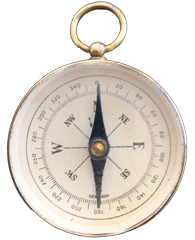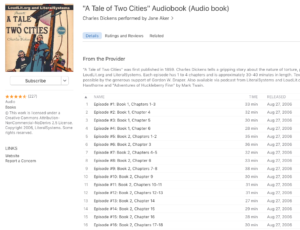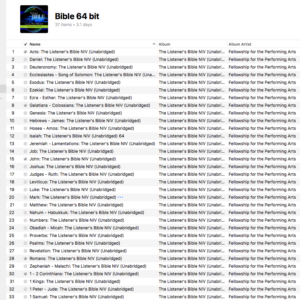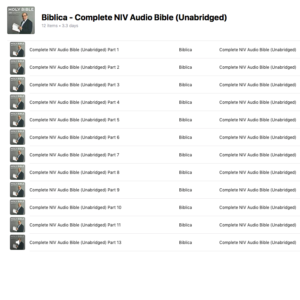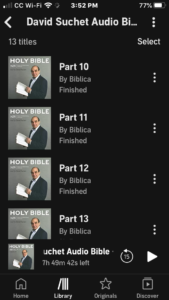The Audio Version Problem
There’s a big problem with well-known, commercial audio versions of the Bible. Mobile versions, especially but not exclusively, present the listener with meaningless numbers instead the historical names of the books of the Bible, something analogous to seeing “City001” on a map instead of “New York City.”
The problem is not the actors reading the Bible, such as reader-actor Max McLean, nominated for four Audie Awards and well-versed in reading the Bible, having recorded it in its entirety in three English translations. The same respect belongs to David Suchet, who got a start in the Royal Shakespeare Company and gained international fame playing Hercule Poirot.
And it’s not the content, the best parts being better than anything I’ve encountered elsewhere, which of course is a matter of faith and sensibility.
The Bible Needs Better Navigation than a Novel
Most people read novels from start to finish (or give up somewhere along the way). Few people reading or listening to The Tale of Two Cities think, “Chapter 5 ‘The Jackal’ is ok, but I think I’ll skip ahead to Chapter 16 ‘Still Knitting’.”
By contrast, few people read (or listen) to the Bible from start to finish. If they try, they often give up (or tune out) somewhere between Leviticus (with statements such as “When someone has a boil on their skin and it heals, and in the place where the boil was, a white swelling or reddish-white spot appears, they must present themselves to the priest”) or, if they push on, they make it part way through one of the prophets, say for instance the “weeping prophet” Jeremiah (who commands “Sound the trumpet in Tekoa! Raise the signal over Beth Hakkerem! For disaster looms out of the north, even terrible destruction”).
Do not misunderstand me. I am not suggesting these sections are without value, but unless one is an anthropologist or Biblical scholar, one usually wants to listen to something one can personally relate to, such as I Corinthians 13 (which includes “Love is patient, love is kind. It does not envy, it does not boast, it is not proud. It does not dishonor others, it is not self-seeking, it is not easily angered, it keeps no record of wrongs”).
For the frequent Bible reader/listener, the Bible becomes a reference book. And for this reason, any version of audio Bible needs to offer the smart-phone/tablet/laptop user something more than a randomly assigned part number. Just as no one wants City001, no one who cares about the Bible wants chapter 892 (which exists in no printed Bible—but does exist, as we will see, in Suchet’s version). Digital products should be easier, not harder to navigate than printed ones. Hyperlinked text has changed our planet and it should use the correct labels in any book, especially in one with as much length and variety as the Bible.
Unfortunately, there are many free audio novels that provide better navigation than commercial audio Bibles. Here, for example, is the navigation of the free LoudLit.org podcast of A Tale of Two Cities performed by Jane Aker, displayed on a laptop:
As you can see (if you clicked on the image), the indexing includes, first, the episode number, as one would expect with a podcast. But that is immediately followed by the chapter numbers as assigned by the author. Also in keeping with how Dickens published the book, the indexing includes the divisions marking the Books (“Book 1,” “Book 2”).
Here’s the view on a mobile device of the same Dickens podcast. There’s less display space on this iPhone SE, but the image shows that the book and chapter numbers, again, are clearly marked:
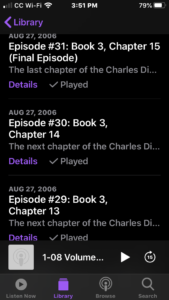
All that’s missing are the chapter names, which would be a nice but not necessary addition. With chapter names, one would know that Chapter 15 of Book the Third is “The Footsteps Die Out Forever,” a description that suggests the sad and glorious ending of the novel. But the main point is that in a typical book, chapter titles are not needed by most readers, who would listen to the book in linear fashion (beginning to middle to end)—unlike the Bible which is listened to in a selective fashion (“today, I’d like some Psalms with a side of Ephesians”).
Problems with McLean’s “The Listener’s Bible”
With the Bible, the need for the correct metadata is much more important than any novel, as The Listener’s Bible, narrated by Max McLean will show. Happily, on a laptop as viewed in iTunes, the Biblical book names are visible (and this is all I’m asking for on mobile devices). Here they are sorted alphabetically, which is fine; it would be nice if one could sort them according to the order one finds them in the Bible (but that is truly dispensable):
However, on a mobile device, The Listener’s Bible displays only Chapter numbers. One must remember there are 66 books, each with chapters, totaling 1,189 chapters. So, think of scrolling through 1,189 chapters, hoping to find Chapter 3 of the Gospel of John. Find it, and you, too, will start to believe in miracles.
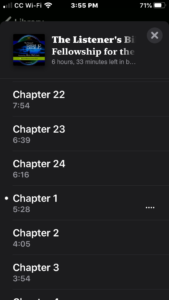
The McLean version has one additional (unnecessary) problem: Chapter 1 of the Gospel of Matthew is not Chapter 1—it is a copyright notice. This notice throws off the chapter numbering for the entire gospel. So even if one isolates the Gospel of John from the other 65 series of chapter numbers, one must go to Chapter 29 in order to arrive at the real Chapter 28.
Worse Problems with Suchet’s NIV Holy Bible (see update at top of page: this has been addressed!)
The worser case (as Hamlet might say) is unfortunately David Suchet’s version (and I doubt he was consulted on the navigation). Even on a laptop, this is what one sees (in iTunes):
Chapters have been left out altogether and replaced by 13 parts, probably divided by duration, arithmetically—not theologically or authorially. Now, I know there are 929 chapters in the Old Testament and 260 in the New, so I figure I need to go to the last quarter of the 13 parts (i.e. about 10-13) for the New Testament, and I’m almost correct, although 10 brings in some of the Old Testament. Should life in the digital age be this difficult?
Finally, the mobile version of Suchet’s reading repeats what one sees on a laptop:
If one looks at the specific track being played, one will get confirmation that, for example, in this case, one is listening to “chapter” 892, which happens to be a chapter in the Book of Jonah.
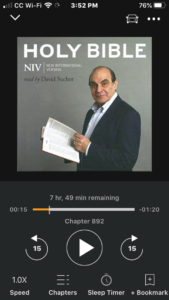
If one wants the story of the giant fish, the repentance of Nineveh, and the worm that made the giant plant whither, one should remember that number! I personally like the story, but if I were throwing someone overboard, you can be sure it wouldn’t be Jonah; it would be the organizations who allow consumers to pay ~$25-$75 (Suchet) or (McLean) for such poorly indexed masterpieces. (The links are to Audible but the price range is derived from non-subscription vendors.)
What Others Say
What you’ve read above is not one person’s complaint. It is echoed in the reviews of these audio versions of the Bible. They frequently give the audio product a high rating for the performer and the content, but are disappointed with the poor navigation. The following snippets represent a small sampling of what can be found on the vendor’s site:
McLean’s Version
- Audible, review by Doud): “Here is a breakdown of where each book of the Bible begins. Finding the books was the complaint of so many like myself so I put this together for all. The format is Name (Part #).(Chapter #) Genesis 1.2 Exodus 2.52 Leviticus 3.92… [etc.]”
- Audible, review by Robertson): “Extremely hard to follow. Needs to be broken down into books in Bible. I had to listen and then write on a piece of paper which books were contained in which part! Very time consuming. ”
- Audible, review by HW): “this would be a five star rating if only the listener could locate the books of the Bible and find some way to determine what is on each illustrated disk. It will take much effort and time to download and note (on paper somewhere) the contents of the 37+ parts of this Bible.”
- Those are among the top positive reviews; the majority of reviews complain about the navigation, some use ALL CAPS (a clear sign of desperation); check them out if you want to see a train wreck between user experience and technology
Suchet’s Version
- Audible, review by Lamkin): “Poorly organized. List of parts and chapters.”
- Audible, review by Amazon Customer 07-21-16): “However, since the book does not come with any sort of table of contents, finding a particular book or verse is time consuming and requires many “guesses.” It is very frustrating, because I purchased the audible version to save time!”
- Audible, review by gb): “HORRIBLE interface. Organized by 100 chapters, I have no idea where I am at in the book or how to find any specific passage. Very frustrating.”
- Those are the top three reviews that mention navigation (as of this writing and sorted by “most helpful”); unlike the majority of reviews on Audible (as well as a quite similar set on the parent company Amazon), the final review cited (“HORRIBLE”) gave the product one star—the rest gave the product four or five in spite of their disappointment concerning navigation; unfortunately, these companies probably have metrics concerning the number of stars and obviously don’t spend much time reading the actual comments, because if they did, one would hope I would not be writing this article.
It’s Not Hard to Fix
As a proof of concept, I imported into iTunes some CDs of the Bible, read by Alexander Scourby, another great reader-actor (1913-1985). After the import, I assigned them “Audiobook” status and exported that to my iPhone. However, a few of the books sorted incorrectly (for example, 2 John did not follow 1 John), so I used a $5 app called Audiobook Builder to rebuild the book, which I again exported to my iPhone:
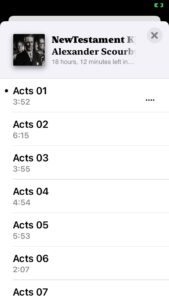
Laptop display gives the same information.
Conclusion
Finally, I did try to communicate the problem of The Listener’s Bible with Audible, whose corporate headquarters are in City002 (Newark, NJ). I am omitting the silly correspondence for the sake of brevity, but it was like trying to describe a third dimension to a piece of paper.
Remember, chapter 892! But if you want to start at the beginning of Jonah, you must go to Part 9, starting at chapter 793, scroll down for a while, and find Chapter 890—Yes, you start Part 9 2/3rds the way through Jeremiah, pass through a heap of books including Obadiah, but then you have found Jonah, Chapter 1 at Chapter 890. Now you’ve arrived and can start throwing manufacturers overboard!
It is my plea with those who make and distribute digital versions of the Bible that they make sure the names of the books of the Bible and the chapter numbers are displayed on all devices, so that readers/listeners can focus on the Bible and not the bad tech.
Notes:
- The screenshots all come from macOS High Sierra (laptop) and iOS 14 (iPhone SE, first generation). Newer versions of macOS, such as Big Sur, display the audiobooks differently but with the same missing information. I do not know if Windows and Androids handle these things differently, and would be glad to be informed, although my bet is that the problem lies mostly in the creation of the files rather than the display technology. It comes to this question: “Should we render these files mechanically, say by equal duration, or should we consult a subject matter expert and get it right?”
- This article deals with commercial downloads, not CDs/DVDs (except for my Scourby proof of concept).
Publishing Info
This post was first published on: Jan. 28, 2021. The alleged publication date has been set earlier in order to bring current posts to the top of the directory.
